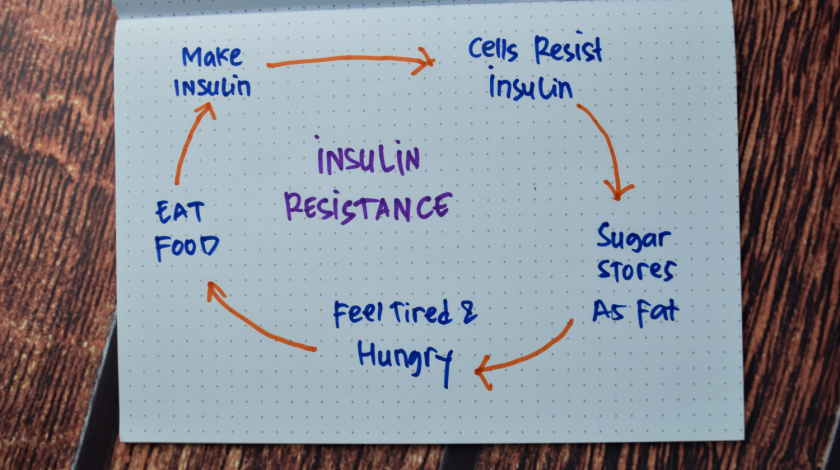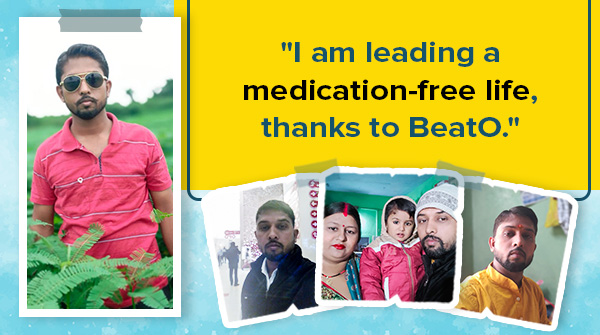“Laughter is the best medicine – unless you have diabetes, then insulin comes pretty high on the list”, a motivational quote by Jasper Carrott may sound blithe and carefree. Still, the fact is diabetes is a serious illness. If the same is not addressed with the right set of actions, it can lead to long-term complications such as organ failure, cardiovascular diseases, and vision loss. For those who are blissfully unaware and those who remain consciously ignorant should know that one of the reasons for diabetes is “insulin resistance”.

Diabetes is no Longer a Stranger
Ever since (1988) Gerald M. Reaven, “father of insulin resistance” revealed the theory of metabolic syndrome and its effect on obesity/insulin impairment, the word “diabetes” has now become a household name. So, what is this menace all about?

What Is Insulin Resistance?
The human body typically converts food into sugar/glucose through a complex metabolic process. And one of the key players in this process is insulin, a hormone that is secreted by the pancreas. Insulin helps transfer glucose to various organs, such as the liver and even muscles. The cells in our body convert glucose into energy for various metabolic activities. At times, it is just accumulated for future use. Resistance to insulin causes sugar build-up. Over a period of time, it leads to a condition called “Pre-diabetes”. No wonder, then, the user search for “how to reverse pre-diabetes” is now a popular phrase.
Causes and Risk Factors of Insulin Resistance
It is believed by the scientific community that one of the major causes of insulin resistance is body fat, especially visceral fat. The research community also believes that obesity results in low-grade inflammation, mainly concerning the tissues. It triggers the production of several anti-inflammatory protein molecules secreted by cells of the immune system. Ironically, it leads to “Glucotoxicity”, which in turn results in insulin resistance.
Some of the other causes for impaired insulin sensitivity include medications (high blood pressure, psychiatric, and HIV) and continuous use of steroids (to fight pain / chronic diseases or body building).
Obese individuals and folks with a family history, poor lifestyle, and sedentary existence are at a higher risk of developing pre-diabetes / diabetes. Social and psychological triggers/actions such as stress and consumption of alcohol/smoking are also high-risk factors. This medical shortcoming can be quickly achieved through an insulin-resistant diet and exercise.
The Link between Insulin Resistance and Type-2 Diabetes
The human body is complex. Its metabolic systems are even more complicated. How so? Our body works round the clock, processing, signaling, and evolving. Some of the old cells cease to exist, while newer ones replace them. And one of the organic processes is glycogenesis. It allows fats, muscles, and the liver to store glycogen for energy needs and also maintains a healthy stock. When the blood sugar level falls, it releases this stored energy back into the system. Individuals with insulin resistance fail to keep up with this cycle of processing/converting/replenishing. It results in glucose build-up. If this medical condition is not addressed through proper diet, exercise, and lifestyle changes, it can evolve into an ailment called “pre-diabetes” and subsequently “Type-2 Diabetes”.
Impact of Insulin Resistance on Overall Health
Insulin resistance symptoms are casual (excessive thirst, hunger, tingling sensation in hands and feet, frequent urination, and wounds that heal slowly) in nature, almost innocent. Still, they can prove catastrophic in the long run. The pancreatic beta cells that develop insulin will inevitably succumb to fatigue, unable to get rid of glucose in the bloodstream and help transport it to the other parts of the body.
The biological stress will cause slow insulin production deterioration, resulting in pre-diabetes / type-2 diabetes. However, its consequences can be even more lethal if ignored. According to some medical societies specialising in diabetes, insulin resistance can double the risk of heart attacks. It can also cause fatal brain stroke and cardiovascular diseases. Some of the studies have found a direct link between insulin resistance and certain types of cancer, too.
Measuring and Diagnosing Insulin Resistance
Before you search for “how to reverse pre-diabetes”, you should first lookup at the reasons and its diagnostic options. The sensitivity of the tissues to insulin is one of the crucial yardsticks to measure and diagnose insulin resistance. This is typically achieved by an euglycemic hyperinsulinemic clamp. However, due to the very nature of glucose metabolism and the body’s reaction to different types of foods, the time at which it is consumed, and lifestyle equations, additional factors are also taken into account before arriving at the conclusion. This includes several glucose challenges, such as the effect of oral glucose consumption or tolerance to certain meals. These pointers are then appended to arrive at a crucial decision.
Read More: Insulin Resistance: What is it, Unveiling Causes, Symptoms, and Effective Prevention Strategies.
Conclusion –
The presence of certain genes, inactive lifestyle, obesity, and carbohydrate-rich foods are some of the reasons for insulin resistance, which incidentally is a cluster of abnormalities that lead to not just pre-diabetes / type-2 diabetes but also increased cardiovascular risks such as heart attack, brain stroke, and peripheral neuropathy to name a few. Fortunately, pre-diabetes and even type-2 diabetes are reversible if the same is addressed meaningfully and scientifically. This includes quitting fatty foods, smoking, and alcohol and committing to healthy and active sustenance.




